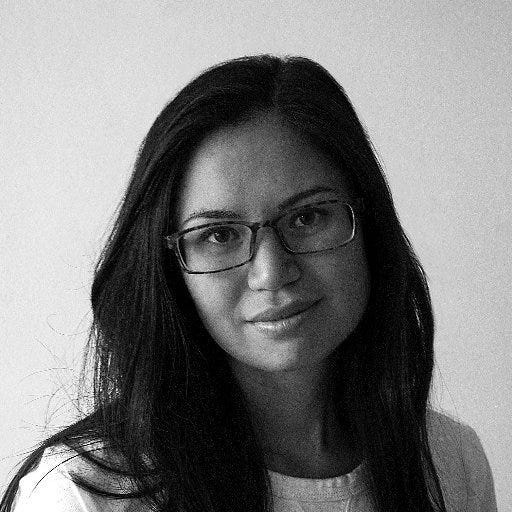A heart condition prepared me for starting menopause in my 30s
Guest writer Jen Hyde finally got a diagnosis. Now she wants to be an advocate for her own healthcare.

Welcome! This is The Heart Dialogues, a free newsletter for people born with heart conditions (and the people who care about them). Every other week, I’ll send you candid conversations, essays, guest posts and/or interesting links about what it’s really like to live with a weird and special heart. Join this community and support my work. Sign up for free.
When I was young, I didn’t meet anyone else with a congenital heart defect—let alone someone who’s about my age and a writer and shares my affinity for Google cal invites. That would be the lovely
, who reached out to me more than a year ago (!) when she saw this newsletter. Since then, we’ve been meeting semi-regularly, talking about our various writing projects and offering feedback on each other’s work.So I was thrilled when she offered to write a piece for
about how living with a heart condition called tetralogy of Fallot informed her experience of perimenopause. As I’ve written before, there is a dearth of information on CHDs and menopause.Based in Los Angeles, Jen has written before about her heart, including this Longreads essay about meeting the women who sewed her bioprosthetic valve and, for the Los Angeles Times, about one of the relationships that grew out of that meeting. Jen also writes The Asian Mom, a Substack on women’s issues. On Mondays, she shares reporting and research on menopause, and on Fridays she shares book and film reviews, interviews, and personal essays.
Without further ado, here is Jen’s piece.
In January 2024, I learned that I am in perimenopause and have been for the past four years. The diagnosis came at a time when I was no longer experiencing severe symptoms, when it seems I will hit menopause soon, and after a time when my body would have benefited from treatment. I am 38 years old.
Perimenopause is the term used for the years leading up to a woman’s final period and can last anywhere between four and 15 years. Typically, women enter perimenopause some time in their 40s and reach menopause after 12 months of no period. Women who experience menopause before 40, or premature menopause, represent 1% of the population. Premature menopause puts women at an elevated risk of coronary heart disease and osteoporosis.
Being in perimenopause at 38 is terrifying, but my congenital heart condition has prepared me for my new, if premature, life stage. I was born with tetralogy of Fallot, a combination of four different heart defects. My unique heart has taught me the necessity of being an expert in my own experience and an advocate in my own healthcare.
I want to help others by sharing what I know.
A surprise valve-replacement surgery
When I was 2 years old, in 1988, I had open heart surgery. The success of the procedure afforded me a clean bill of health into my teenage years. Growing up in the 1990s in Orange County, Calif., my heart disease was managed by a pediatric cardiologist I saw at annual checkups. The year I turned 18, my cardiologist retired. Although he suggested I ought to seek out followup care in my adult life, I wasn’t referred to an adult program. Upon graduation, I moved to New York for college and fell out of care altogether.
When I was 23, my mother insisted that I get my heart checked. I was asymptomatic, but our family doctor ordered an echo. I expected the results to yield yet another clean bill of health, but I was in pulmonary hypertension and the early stages of heart failure. A few months later, I had surgery to replace my pulmonary valve, a common procedure for people with tetralogy of Fallot.
A decade later, I became a mother. At my first postpartum cardiology appointment, I learned that my pregnancy had altered my heart function, and my tricuspid valve had started to leak severely. My cardiologist told me that tricuspid repair was inevitable, and that it was rare. There wasn’t a standard procedure for tetralogy of Fallot patients the way there was for a pulmonary valve repair. At 36, I had a third open heart surgery to replace my pulmonary valve a second time and to repair my tricuspid valve.
My “special periods”
In the midst of all of this, although I didn’t know it at the time, my perimenopause symptoms started. My son was a year old, and I was learning how to manage motherhood and my leaky tricuspid valve, when I got my first “special period.” For several months, these special periods were so heavy I could not sit on a surface without ruining it with blood. The gynecologist I saw ordered ultrasounds and blood tests that came back normal.
The heavy periods subsided, replaced by anxiety, depression, brain fog and fatigue. My gynecologist told me that the symptoms were likely from postpartum hormones and new motherhood, and I believed her because the early years of motherhood are hard. I’d never heard of perimenopause. I tried to address the issues by going to virtual therapy appointments during my son’s midday nap or while he was in preschool.
I shrugged off these symptoms for three years. Then my period went missing for two months. When I asked my doctor if I was in menopause, she chuckled and insisted I was too young. My period went missing for another two months. Finally, she sent me to another gynecologist, who ordered some tests and, in January, diagnosed me with perimenopause over the phone.
This gynecologist suggested supplements, weight-bearing exercises and, when I officially hit menopause, hormone replacement therapy. She warned me that HRT, which could alleviate some symptoms and potentially protect my overall health, comes with risk (not because of my CHD, but because HRT research is inadequate). She also told me that even though my lack of a period was likely a sign I was nearing the end of perimenopause, I would not be considered as having premature menopause because I’m almost 40.
The necessity of community
I expected the gynecologist to take a more serious approach because I’m only 38. Having CHD has taught me that precaution can save a life. I’ve learned about the benefits of establishing baselines. I hate my annual cardiac MRI, but I commit to retraumatizing myself every year because I believe having the data ensures my care is preventative rather than reactive.
Luckily, I knew what to do. I consulted Facebook and Reddit forums for perspectives on gynecologists, eventually stumbling on a suggestion to search the North American Menopause Society’s practitioner database for a certified menopause expert.
“I shrugged off these symptoms for three years. Then my period went missing for two months. When I asked my doctor if I was in menopause, she chuckled and insisted I was too young. My period went missing for another two months.”
It reminded me of the time after I had learned that I would need a tricuspid repair. I had moved back to California and needed a new cardiologist. I consulted the Adult Congenital Heart Association’s database of certified clinics and practitioners, as well as my then doctor’s referrals. When surgery was inevitable, I asked about tricuspid repair surgeons in Zipper Sisters, a Facebook group for women with CHD. Months before my third heart surgery, I developed a close friendship with a woman who’d had the same repair done by the surgeon who was scheduled to do mine. Kristen walked me through what to expect. Her mentorship got me through the harrowing post-op hours, when I was intubated and awake, an experience that had traumatized me during my second open heart surgery at 23.
I’m leaning into the menopause community in the same way. I started listening to podcasts produced by gynecologists in the U.K. and Australia where menopause care is more accessible than in the U.S. I joined perimenopause forums on Facebook. I subscribed to Substack newsletters like
, which looks at menopause as a cultural experience rather than a medical condition that can be pathologized. I am looking for experiences that reflect my own, and for a better understanding of the treatment I need and the cultural biases about them.Finding the right doctors
Recently, I found a gynecologist through the NAMS database and messaged her through her patient portal to schedule an appointment. She was on vacation, but a colleague wrote back the next day, praising me for reaching out because premature menopause comes with additional risks and requires specialized care. She assured me that I had done the right thing. I cried tears of relief.
In the years between my second and third heart surgeries, I had started going to an adult congenital cardiology program. I learned that adult CHD care is specific, and that general cardiologists and other physicians don’t necessarily understand the way our hearts work. Just as not all cardiologists can treat adults with CHD, not all gynecologists are equipped to treat aging women’s reproductive health. Perimenopause and premature menopause aren’t well understood, so it is up to me to find gynecologists who treat menopausal women.
I want to encourage other women not to settle for care that feels inadequate. Aging with CHD has given me wisdom and the power to question medical authority. I have skin in the game both for myself and other people seeking care. Because of my CHD, I seek out medical practitioners who treat people’s health conditions in light of their individual situations, experiences and needs.
I have a right to feel the way I do
Like other women with CHD, I have no idea how menopause will affect my heart. My cardiologists have had many conversations with me about starting a family, but we’ve never discussed how other aspects of my reproductive health impact my heart health as I age. This is partly because of a lack of research about menopause and CHD (aging with CHD is a recent phenomenon) but perhaps also because our culture believes having children is a moral issue whereas aging is a given.
Still, whatever I feel about a medical diagnosis is human. I have the right to feel angry that there doesn’t exist the level of knowledge or cultural conversation around menopause that there does for pregnancy and motherhood. I have the right to be hurt by the conversations I’ve had with practitioners who misdiagnosed me and resist treating me with extra care. I have a moral obligation to advocate for myself, and to embrace being a “body of research” to save my life and maybe someone else’s.
Have you experienced menopause or its earlier stages? How did this impact your heart health? Let us know!







I have been in menopause for about 2 years now, and I love it. I'm much more even keeled in my moods.
Backing up 10 years, I had a large cyst on an ovary. But because of my CHD, I'm high risk for any surgery. I had several ultrasounds and saw an oncologist, who ruled out any cancer. This doctor did say that the ovaries do something for the heart, we know that estrogen helps the heart, but there's something else that we can't figure out. I liked his openness and honesty, but it also made me uneasy.
Am I at greater risk for more heart problems since menopause? Does my CHD play a larger part than what happens with a normal heart in menopause? I agree, there needs to be more research for CHD and menopause.
I know that it is a miracle that I am even alive, and I'm thankful to Almighty God for that, so I will continue to trust Him for what is ahead.
Thank you so much for being transparent in your experience. I appreciate the article.
Thank you for sharing your story. I hope you are doing well.
I am 57 yrs old and was born with a cyanotic heart defect called Total Anomalous Pulmonary Venous Return (TAPVR). I had my daughter when I was 29 and experienced perimenopause at 33 and menopause at 35. I never experienced any of the unpleasant symptoms and have a normal bone density.
I worked in a level III neonatal intensive care unit at the time of my menopause and when I was chatting with the high-risk Obstetricians I worked with about my premature menopause, they postulated that perhaps during the first 6-years of my life, when I lived hypoxic, my ovaries took the brunt of the hypoxia, causing them to fail early. My treatment when diagnosed with TAPVR at birth, included a shunt. This created a mixture of venous and oxygenated blood circulation and I lived with oxygen saturations below the normal level. I did not have my corrective surgery until I was 6.
I ran this theory by my cardiologist (I see an adult congenital heart specialist) and she agreed that could be a feasible theory. Definitely a great question and I’d love to know what the incidence of premature menopause is among CHD women.